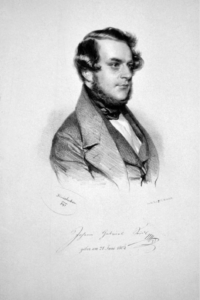Longing
(Poet's title: Sehnsucht)
Set by Schubert:
D 879
[March 1826]
Die Scheibe friert, der Wind ist rau,
Der nächt’ge Himmel rein und blau:
Ich sitz in meinem Kämmerlein
Und schau ins reine Blau hinein.
Mir fehlt etwas, das fühl ich gut,
Mir fehlt mein Lieb, das treue Blut:
Und will ich in die Sterne sehn,
Muss stets das Aug mir übergehn.
Mein Lieb, wo weilst du nur so fern,
Mein schöner Stern, mein Augenstern?
Du weißt, dich lieb und brauch ich ja,
Die Träne tritt mir wieder nah.
Da quält’ ich mich so manchen Tag,
Weil mir kein Lied gelingen mag, –
Weil’s nimmer sich erzwingen lässt
Und frei hinsäuselt, wie der West.
Wie mild mich’s wieder grad durchglüht –
Sieh nur – das ist ja schon ein Lied!
Wenn mich mein Los vom Liebchen warf,
Dann fühl ich, dass ich singen darf.
The window pane has frozen, the wind is rough,
The night-time sky is pure and blue:
I am sitting in my little room
And I am looking out into pure blueness!
I am missing something, I am well aware of it,
I am missing my beloved, my faithful blood:
And if I choose to look into the stars
My eyes will always have to fill with tears!
My love, where can you be staying, so far away,
My beautiful star, star of my eyes?!
You know that I really love you and need you, –
I can feel the tears coming back again.
I have tormented myself over this for so many days,
Since I have not managed to produce a song, –
Since these things can never be produced to order,
They are emitted freely, like the west wind!
It is warming me up in such a gentle way! –
Just look – here is a song already!
Even though my fate propelled me away from my beloved
I now feel that I can sing.
All translations into English that appear on this website, unless otherwise stated, are by Malcolm Wren. You are free to use them on condition that you acknowledge Malcolm Wren as the translator and schubertsong.uk as the source. Unless otherwise stated, the comments and essays that appear after the texts and translations are by Malcolm Wren and are © Copyright.
☙
Themes and images in this text:
Blood East and West Eyes Fate, luck and lotteries Frost and ice Heaven, the sky Longing and yearning Rooms Songs (general) Stars Tears and crying Wind Windows
Although it is a cloudless, starry night, there is a raw wind and it is freezing cold. The poet wants to look up to the clear sky, but the window pane is covered in frost and his own eyes are filling with tears. He wants to peer into the distance to catch sight of his special star, the light of his life, but she is both far away and his own tears obstruct the view. His ‘beautiful star’, his ‘eye-star’, cannot be seen. Since the word ‘Augenstern’ (eye-star) was also a poetic word for the dilating pupil of the eye, it is apparent that the problem relates both to the object being perceived and the subject doing the looking.
This explains something of the tonal shift in the poem between stanzas 3 and 4. For a long time he has not been able to see his way to producing a poem or a song. He has been struggling with what he is missing, with what he cannot attain. Then, he returns to the imagery of the opening. The raw wind that is blowing reminds him of the unforced nature of creativity. Just as the west wind cannot be made to blow, however much we try, poems and songs cannot be made on demand. This realisation frees him from much of his anxiety. The frozen window-pane, which had earlier symbolised his eyes attempting to peer out through the mist of tears, now begins to clear. He feels a gentle glow, a warmth that removes the ice. Clarity is restored to his vision. It is his very longing, his actual inability to see the beloved, the star of his eye, that allows him to sing. He now has insight.
☙
Original Spelling Sehnsucht Die Scheibe friert, der Wind ist rauh, Der nächt'ge Himmel rein und blau: Ich sitz' in meinem Kämmerlein Und schau in's reine Blau hinein! Mir fehlt etwas, das fühl' ich gut, Mir fehlt mein Lieb, das treue Blut: Und will ich in die Sterne sehn, Muß stets das Aug mir übergehn! Mein Lieb, wo weilst du nur so fern, Mein schöner Stern, mein Augenstern?! Du weißt, dich lieb' und brauch' ich ja, - Die Thräne tritt mir wieder nah. Da quält' ich mich so manchen Tag, Weil mir kein Lied gelingen mag, - Weil's nimmer sich erzwingen läßt Und frei hinsäuselt, wie der West! Wie mild mich's wieder grad durchglüht! - Sieh nur - das ist ja schon ein Lied! Wenn mich mein Loos vom Liebchen warf, Dann fühl' ich, daß ich singen darf.
Confirmed by Peter Rastl with Schubert’s source, Joh. Gabr. Seidl’s Dichtungen. Zweiter Theil. Lieder der Nacht. […] Von Johann Gabriel Seidl. Wien. Druck und Verlag von J. P. Sollinger. 1826, page 31; and with Lieder der Nacht. Von Johann Gabriel Seidl. Zweite, verbesserte und vermehrte Auflage. Wien, 1851. Druck und Verlag von J. P. Sollinger’s Witwe, pages 108-109.
To see an early edition of the text, go to page 31 [39 von 190] here: http://digital.onb.ac.at/OnbViewer/viewer.faces?doc=ABO_%2BZ179729407


